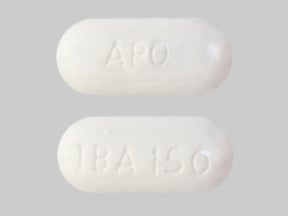
Boniva Coupons & Savings Card – Discount Prices from $22.04
Brand for: Ibandronate
My prescription
Edit
150MG, Ibandronate (3 Tablets)
Select pharmacy

CVS
$29.56
COUPON PRICE
Walmart
$22.04
COUPON PRICE
Albertsons
$23.46
COUPON PRICE
Walgreens
$27.33
COUPON PRICEBoniva savings card
Show this card to your pharmacist
Walmart
$22.04
BIN
ID
PCN
GRP
019876
LHB925AB65
CHIPPO
LHX
Powered by
Related bisphosphonates prescriptions
More prescriptions for osteoporosis
Related bisphosphonates prescriptions
More prescriptions for osteoporosis
Boniva (Ibandronate) dosage forms
Dosage Quantity Price from Per unit 150MG 3 Tablets $22.04 $7.35 150MG 1 Tablet $6.85 $6.85
| Dosage | Quantity | Price from | Per unit |
|---|---|---|---|
| 150MG | 3 Tablets | $22.04 | $7.35 |
| 150MG | 1 Tablet | $6.85 | $6.85 |
Is Boniva still being prescribed?
Yes, Boniva is still being prescribed. It is commonly used for the treatment and prevention of osteoporosis in postmenopausal women. However, the decision to prescribe Boniva depends on individual patient needs and a healthcare provider's assessment.
Which is safer, Boniva or Fosamax?
The safety of Boniva (ibandronate) versus Fosamax (alendronate) can vary depending on the individual's health condition, medical history, and specific needs. Both medications are bisphosphonates used to treat or prevent osteoporosis. They have similar side effects, such as gastrointestinal issues, but the frequency and severity can differ between individuals. It is important for a healthcare provider to evaluate the patient's overall health, risk factors, and preferences to determine which medication is safer and more appropriate for them.
What is the most common side effect of Boniva?
The most common side effect of Boniva (ibandronate) is gastrointestinal discomfort, which may include symptoms such as nausea, diarrhea, or upset stomach.
What is the generic for Boniva?
The generic name for Boniva is ibandronate.
Does Boniva make your joints hurt?
Joint pain can be a side effect of Boniva (ibandronate). If someone experiences joint pain while taking Boniva, it is advisable to consult with a healthcare provider to discuss the symptoms and consider alternative treatments if necessary.
